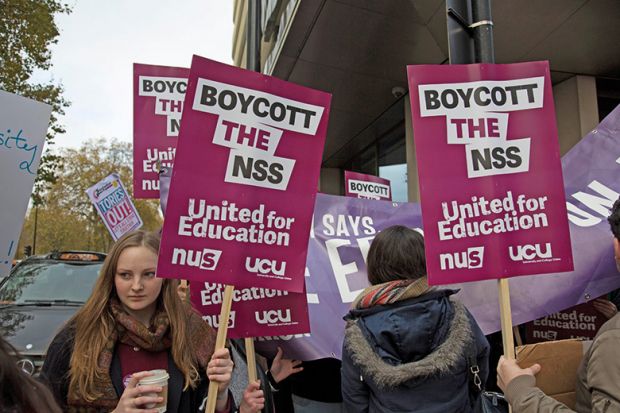The National Student Survey (NSS) has been a controversial topic in the sector for as long as it has existed. From academics to trade unions, there has been widespread concern about the marketisation of higher education and the increasingly prevalent league table culture, which the NSS perpetuates.
As a student activist and a union president, I have been a long-standing critic of the impacts of the NSS. However, now as a vice-president of the National Union of Students and since the reforms to the NSS last year, I believe that there is an equally dangerous and deceptive game being played: using the NSS to change by stealth the nature and work of students’ unions, guilds and associations.
It has been more than 10 years since the launch of the NSS. The annual “student satisfaction” survey goes out to final-year undergraduate students with the aim of gathering feedback on issues ranging from quality of teaching to course support. But the survey has always attempted to measure students’ unions, too.
Since its inception, the survey has had a singular statement for students to measure their perceptions of their local union. It reads: “I am satisfied with the Students’ Union (Association or Guild) at my institution.”
There are obvious flaws to measuring perceptions against this statement, which is commonly known as Question 23. It’s vague. It’s unclear. And most students will struggle to clearly differentiate between areas of work in which their students’ union leads and decisions their institution makes. Nonetheless, for more than a decade unions powered through. Many had no choice, as vice-chancellors and executive teams formally and informally linked their success in the NSS to their funding streams. But last year things changed.
Along with the government’s White Paper and biggest reforms to higher education in a decade, a significant shift was made to the NSS, and to Question 23. The statement changed away from a general satisfaction with students’ unions to the new Question 26: “The students’ union (association or guild) effectively represents students’ academic interests.”
To a casual observer, this is surely a good thing. A central mission of any students’ union is to represent the academic interest of students and to improve their educational experience. Surely this just means that unions can better focus on core objectives, right? Wrong.
Of course, I, like our whole movement, recognise the importance of academic representation. Thousands of academic sabbatical officers, volunteer reps and students’ union staff members work day and night to ensure that our institutions and courses are best fit to deliver for our members. But here’s the secret, and here’s a central problem behind Question 26. The question fails to measure the area where the most effective academic representation happens: university committees, where officers and reps so often stop incredibly detrimental changes and policies.
A space no one sees, meetings no one hears of, but where the real battles take place.
And it’s not just this. The new question completely sidelines so much critical work undertaken by students’ unions. Let’s look at the welfare campaigns and activities that students’ unions are pioneering across the UK, such as leading the way in better mental health provision while institutions are cutting services; fighting for more accessible campuses; addressing the attainment gap; and campaigning for international students.
Then there are all the student activities they run. The sports clubs that provide a new family for people leaving home; the societies that create a vibrant campus; the RAG and volunteering teams making campuses better places; and the skills and experiences brought by student media teams.
The truth is, students’ unions could stop doing this work and vacate this space and focus instead on traditional “academic representation” – and there is no way institutions are going to pick it up. Much of this work, which keeps the most vulnerable and under-represented students in education and makes campuses more vibrant and inclusive spaces, is just going to stop.
And it is no accident.
This is a deliberate and deceptive attempt by the government to change the very nature of students’ unions. They know what I and many others know: as institutions ramp up pressure and tie funding for students’ unions to improvements in NSS scores, our unions will be forced to change the nature of their work.
So while last year the talk of the town was hundreds of thousands of students boycotting the NSS in protest against the link to increasing tuition fees, there is, I believe, now another reason for us to oppose the NSS. The very future of our students’ unions. The future of our diverse and impactful activity. Our ability to change institutions, society and the lives of 7 million students in the UK and beyond.
Ali Milani is vice-president, union development, at the National Union of Students.




